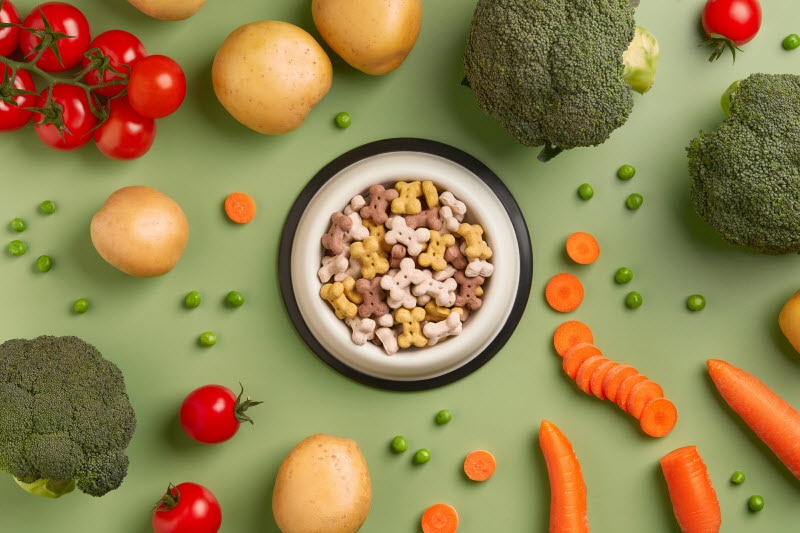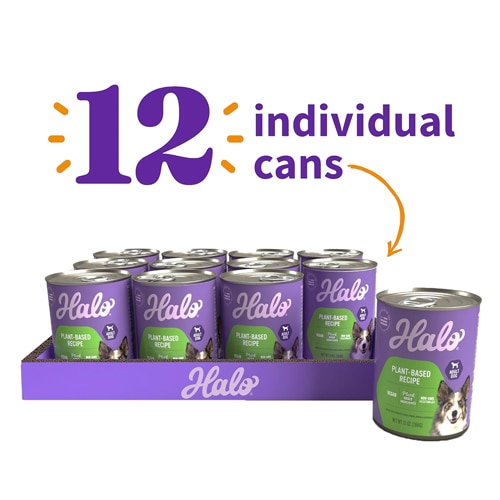 Dogs that spent one year eating a plant-based dog food made with pea protein were in good health at the end of the experiment, according to a new study from researchers at Western University of Health Sciences in Pomona, California and the University of California-Berkeley.
These pooches showed no signs of amino acid deficiencies or heart problems.
In addition, eating the pea protein dog food may have corrected vitamin D deficiency in some of the animals. Seven of the 15 dogs that participated in the study had low levels of 25-hydroxyvitamin D before beginning the new diet.
Six of those dogs had normal vitamin D levels six months into the study, and the seventh dog achieved the same goal at 12 months. The researchers note that none of the dogs received any extra supplementation.
The researchers’ findings arrive at a time when there has been some controversy about feeding dogs a plant-based diet.
In 2018, the U.S. Food and Drug Administration investigated a possible link between dog foods labeled as grain-free and a diagnosis of canine dilated cardiomyopathy, or DCM, in dogs who consumed such foods.
DCM attacks a dog's cardiac muscle, preventing the heart from generating the pressure necessary to pump blood throughout the animal’s vascular system.
Ultimately, the FDA concluded that that there was not sufficient data to show that such diets – including those with peas, lentils, other legume seeds or potatoes as chief ingredients – cause DCM.
Dogs that spent one year eating a plant-based dog food made with pea protein were in good health at the end of the experiment, according to a new study from researchers at Western University of Health Sciences in Pomona, California and the University of California-Berkeley.
These pooches showed no signs of amino acid deficiencies or heart problems.
In addition, eating the pea protein dog food may have corrected vitamin D deficiency in some of the animals. Seven of the 15 dogs that participated in the study had low levels of 25-hydroxyvitamin D before beginning the new diet.
Six of those dogs had normal vitamin D levels six months into the study, and the seventh dog achieved the same goal at 12 months. The researchers note that none of the dogs received any extra supplementation.
The researchers’ findings arrive at a time when there has been some controversy about feeding dogs a plant-based diet.
In 2018, the U.S. Food and Drug Administration investigated a possible link between dog foods labeled as grain-free and a diagnosis of canine dilated cardiomyopathy, or DCM, in dogs who consumed such foods.
DCM attacks a dog's cardiac muscle, preventing the heart from generating the pressure necessary to pump blood throughout the animal’s vascular system.
Ultimately, the FDA concluded that that there was not sufficient data to show that such diets – including those with peas, lentils, other legume seeds or potatoes as chief ingredients – cause DCM.
Halo Wet Dog Food Vegan Non-GMO Vegetables Plant-Based Recipe Description
-
Vegan
-
Complete & Balanced Nutrition
-
No Animal Protein or Dairy
-
Non-GMO Veggies
-
No Rice or Fillers
-
High Protein Peas, Chickpeas, Barley & Oats
-
Non-GMO Fruits & Vegetables
-
Holistic Plant Protein
-
No Meat and No Dairy
Feeding your four-legged friend a holistic diet makes a whole lot of difference when it’s Halo Holistic Garden of Vegan Recipe Adult Canned Dog Food. Featuring wholesome ingredients from the earth, this special vegan formula is made with nutrient-rich chickpeas, a cornucopia of non-GMO garden vegetables and nourishing oils. It’s a highly digestible, complete and balanced non-meat diet that also includes a special vegan blend of vitamins, minerals and trace nutrients. Designed to keep your canine companion happy and healthy–inside and out, this is an ideal food for those wishing to feed their dog a vegan diet, as well as those pets with sensitivities or allergies to more traditional dog foods.
Benefits:
-
Wholesome, vegan blend of chickpeas, non-GMO vegetables and nourishing oils provide complete and balanced nutrition.
-
Made in the USA with no meat protein, dairy, rice, corn, wheat or wheat gluten, as well as no artificial colors, flavors or preservatives.
-
Potatoes, peas, carrots, spinach and more provide essential antioxidants, fiber and vitamins.
-
Beneficial omega fatty acids from flaxseed and olive oil promote healthy skin and lustrous coat.
-
Smooth, delicious texture provides additional hydration and can be used as a delicious topper over dry kibble to entice a picky eater.
Adult:
-
1 - 1 1/4 ounce per lb. of body weight (1-10 pounds)
-
3/4 - 1 ounce per lb. of body weight (10-30 lbs.)
-
2/3 - 3/4 ounce per lb. of body weight (30-50 lbs.)
-
1/2 - 2/3 ounce per lb. of body weight (over 50 lbs.)
Transition Instructions:
Days 1 - 3: 75% non Halo food, 25% Halo
Days 4 - 5: 50% non Halo food, 50% Halo
Days 6 - 7: 25% non Halo food, 75% Halo
Days 8+: 100% Halo
Pets with sensitive stomachs may need to transition a little more slowly to avoid any digestive upset. If you introduce the new food too quickly and your cat or dog experiences some digestive upset, just back up to the previous transition amount where your pet wasn’t having any trouble and feed that amount for a few more days before continuing with the transition. Once your pet is eating all Halo food, if you switch between Halo recipes, consider a 2- or 3-day transition to minimize stomach upset.
*These statements have not been evaluated by the Food and Drug Administration. This product is not intended to diagnose, treat, cure, or prevent any disease.
| Amount Per Serving | % Daily Value | |
| Guaranteed Analysis | ||
| Crude Protein (Min) | 5.75% | |
| Crude Fat (Min) | 3.50% | |
| Crude Fiber (Max) | 2.0% | |
| Moisture (Max) | 78.0% | |
| Calorie Content : 1,029kcal/kg, 161 kcal/cup | ||



